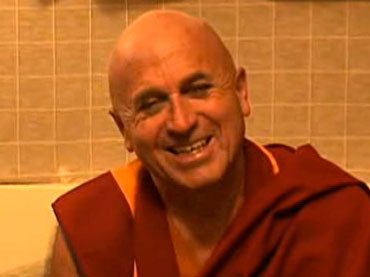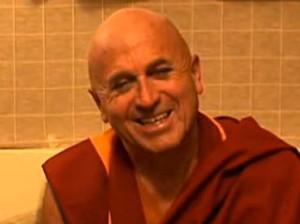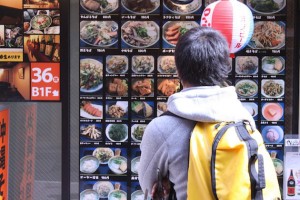Matthieu Ricard was born in France in 1946. The son of famous French Philosopher Jean-François Revel and painter Yahne Le Toumelin, he grew up amongst the French elite. He studied biology and had a promising career when, in 1972, after completing his doctoral thesis in molecular genetics, Ricard decided to forsake his scientific career to the practice of Tibetan Buddhism. He moved to the Tibetan Himalayas and has been living there since then. Since 1989, he has been the French interpreter for HH the Dalai Lama.
 He was nicknamed “the happiest man on earth”, after he participated in a study conducted by the University of Wisconsin that aimed at evaluating the level of happiness of individuals, amongst which were Buddhist monks. The test that used 256 sensors attached to the skull, and three hours of continuous MRI scanning, showed that Ricard’s happiness level was far above all other participants. That same study also proved the neuroplasticity of the brain demonstrating that meditation can play a key role in anybody’s quest for happiness, by restructuring the brain’s neurons.
He was nicknamed “the happiest man on earth”, after he participated in a study conducted by the University of Wisconsin that aimed at evaluating the level of happiness of individuals, amongst which were Buddhist monks. The test that used 256 sensors attached to the skull, and three hours of continuous MRI scanning, showed that Ricard’s happiness level was far above all other participants. That same study also proved the neuroplasticity of the brain demonstrating that meditation can play a key role in anybody’s quest for happiness, by restructuring the brain’s neurons.
Ricard has written several books. Amongst others, Happiness: A guide to developing life’s most important skill, in which he gives advice on how to live a happy life. One of the most important aspect of his teachings is that, as you can train your body, he believes you can also train your mind. For that reason, happiness is a skill that everyone can develop.
For him, at the source of unhappiness, there are feelings of jealousy, anger, obsessive desire and arrogance. Since all of these emotions are fleeting and transient, it is possible to prevent them from invading your mind and tormenting you.
How do you do that? First, by not responding to the emotion. If you feed the emotion, it will most likely grow. However, you cannot deny it either. You need to look at the emotion and let it dissolve. By repeatedly practicing that technique, he believes that negative emotions can flow through you “as a bird crosses the sky and disappears” and therefore not affect your wellbeing.
According to Ricard, behind every thought lies what he calls pure consciousness. Through love, kindness, benevolence, selfless generosity and compassion, and obviously through the practice of meditation, it is possible to access that pure consciousness and flourish.
When speaking of happiness, Ricard refers to the Sanskrit word for this state of being: sukha.
“Sukha is the state of lasting well-being that manifests itself when we have freed ourselves of mental blindness and afflictive emotions. It is also the wisdom that allows us to see the world as it is, without veils or distortions. It is, finally, the joy of moving toward inner freedom and the loving-kindness that radiates toward others.”
The author is Alina Boutros, who owns a University Master’s Degree in Literary Studies, has been researching happiness for the past year. You can read her daily posts on http://alina-500daystohappiness.blogspot.com




